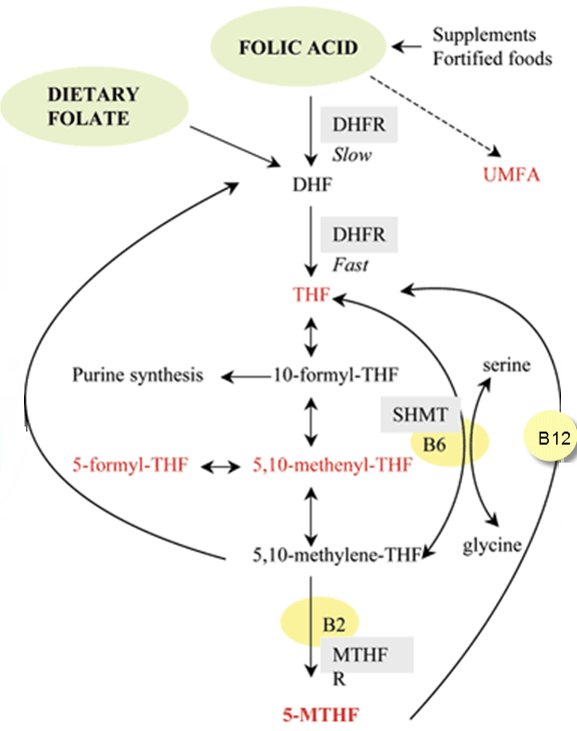Headaches from tyrosine. I think it skews my neurotransmitters too much.
My flat affect "feels" like low bh4, whatever that means. Crucially, A1298C doesn't affect MTFHR. It affects conversation of MTFHR into BH4. So I'm not sure how exactly to drive more of this conversion, more folate or not. Why do you suggest b2 and b6?
A1298C does affect MTHFR:
https://genesight.co...c-polymorphism/
Table 1: The Effect of the MTHFR C677T and A1298C Polymorphisms on MTHFR Enzyme Activity
Genotype 677CC 677CT 677TT 1298 AA 100% 51-73%2-4 22-32%2-4 1298 AC 60-92%2-4 36-60%2-4 N/A 1298 CC 52-60%2-4 N/A N/A
*Percentages denote MTHFR enzyme activity. Ranges are included to reflect different values reported in the literature.
(ok this is supposed to be a table, click on the link for the right format)
And MTHFR doesn't convert BH4, do you mean DHFR? DHFR (dihydrofolate reductase) converts DHF to THF but also BH2 to BH4, and I don't think this happens concurrently, I think they compete for the enzyme. Here's why I think that:

It seems that in the normal folate cycle, 5,10-MTHF converts to 5-MTHF (by way of the MTHFR enzyme) which would eventually lead to THF and back to 5,10,-MTHF again.
But with a A1298C polymorphism (less MTHFR activity or a Vitamin B2 deficiency) the conversion is slowed and 5,10-MTHF gets backed up. Instead, 5,10-MTHF converts to DHF (by the enzyme Thymidylate Synthase (TS) which uses deoxyuridine monophosphate (dUMP) as a cofactor). Then, DHF has to convert to THF to re-enter the normal folate cycle. In order to do that, it uses the DHFR enzyme and competes with BH2. It might be that DHFR has a higher affinity for DHF than it does for BH2 so less BH4 is synthesized in order to prioritize making THF needed in the folate cycle. And this is why low BH4 levels may be a thing.
I searched online and found what you said, that A1298C is not so much implicated with high homocysteine levels and is more implicated in cases of low BH4 levels, but they don't give an explanation how or why. I couldn't find information that A1298C is directly involved in BH4 recycling over C677T, only that it seems to be implicated, maybe by clinical or anecdotal evidence?? From my understanding, both C677T and A1298C mutations should lower BH4 levels since they both are components of the MTHFR gene (which converts 5,10-MTHF to 5-MTHF)
Also I'm totally making the assumption that DHF and BH2 are competitive for one another as a substrate for DHFR, not that they are both required for that one reaction, as the arrows might appear to indicate. I got that from this:
https://www.mygenefo...n-bh4-can-make/
"As mentioned above, several studies have shown that DHFR can recycle BH4 from BH2. This study by Xu et al (R) investigates its role in detail, trying to understand how QDPR and DHFR interact. Using mice completely lacking the QDPR gene, the authors discovered that DHFR was able to step in and replace its activity. However, there are a couple of caveats that go with the study. Firstly, the affinity of DHFR for BH2 is much lower than for DHF, so the authors propose that the recycling activity of DHFR only kicks in when levels of BH2 are high. Secondly, the authors also state that the affinity of mouse DHFR for BH2 is much higher than that of the human form. So, whilst DHFR may be able to step in to assist BH2 to BH4 processing its importance might be much lower. Finally, the authors show that high levels of BH2 also lead to a reduction in the availability of THF. The logical explanation for this would be that DHF. THF activity is reduced as DHFR is converting BH2 > BH4. However, this doesn’t seem to be the case. The authors were unable to exactly pinpoint how these were linked but hypothesized that excess BH2 may impact on the activity of other enzymes such as MTHFR."

Edited by Furniture, 26 January 2019 - 09:39 PM.


















































